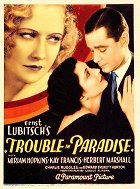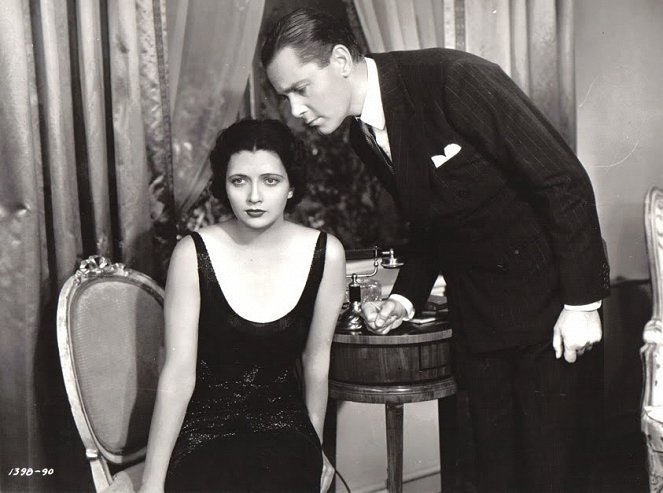Režie:
Ernst LubitschKamera:
Victor MilnerHudba:
W. Franke HarlingHrají:
Miriam Hopkins, Kay Francis, Herbert Marshall, Charles Ruggles, Edward Everett Horton, C. Aubrey Smith, Robert Greig, Rolfe Sedan, Luis Alberni (více)Obsahy(1)
Jedním ze zvláštních rysů Lubitsche byla jeho celoživotní náklonnost ke všemu maďarskému, dalším pak schopnost přetvářet podřadné náměty ve vynikající filmy. A právě z této kombinace vznikl i Útěk z ráje, omamně perlivá komedie s příchutí šampaňského plného odlesků měsíce. Hra Laszla Aladara Čestný nálezce, vycházející z dobrodružství podvodníka Georgese Manolescua, měla nesoudržnou stavbu, na druhé straně se vyznačovala zajímavou zápletkou a romantickými postavami. Ve spolupráci se svým tehdejším scenáristou Samuelem Raphaelsonem rozehrává Lubitsch brilantní milostná manévrování lupiče gentlemana mezi dvěma ženami. Ovšem postavy tohoto trojúhelníku nejsou konvenčně sympatické, součástí jejich šarmu je vybroušený cynismus. Útěk z ráje vznikl ještě v době, než byla studia donucena opět stroze dodržovat cenzurní pravidla Haysova mravnostního kodexu. (oficiální text distributora)
(více)Recenze (27)
"Don't you dare to call me Adolf." Klasická hollywoodska komédia režírovaná slávnym nemeckým režisérom, zaradená medzi 1001 filmov, ktoré musíte vidieť, než umriete. Zábavné to pre mňa určite bolo, len ten príbeh sa mi zdal akýsi zmätený, chcelo by to podľa mňa trochu ho rozviesť. Herecky to je výborne zahraté (nielen ústrednou trojicou, ale aj dvojicou nápadníkov, či ďalšími hercami vo vedľajších rolách), tá medová, obohraná hudba sa mi naopak zdala dosť otravná. "I love you." "I believe you." "Then why do you want to go?" "Because I want to make it tough for you." ()
Povedená komedie z netradičního prostředí, ústřední zlodějská dvojička je velice okouzlující a sympatická, stejně tak příběh točící se kolem milostného trojúhelníku. Výborné repliky i decentní vtípky pomáhají k vytvoření velice příjemného dojmu z celého filmu, ze kterého číší hravost a nádech ironie. ()
Výborná komedie z rané doby zvukového filmu. Dialogy už zde začínají fungovat jako nejdůležitější komický prvek namísto doprovodu pantomických scén, jak tomu je u jiných snímků z počátku 30. let. I přes tu velkou škálu podvodnikcých komedií co jsem již zhlédl, mě i tento starý kus neustále něčím příjemně překvapoval a bavil. ()
Místy překvapivě rafinované. Pěkné :] ()
Yes, Baron. What shall we start with, Baron - If Casanova suddenly turned out to be Romeo... having supper with Juliet.. who might become Cleopatra, how would you start? I would start with cocktails ()
Prostě tento film nemá chybu. Perfektní dialogy. Špičková režie. Nemá hluchá místa. Každý záběr i slovo sedí. Na rok 1932 geniální. Prostě rafinovaná zábava. I dnes by se z něj v Hollywoodu mohli učit, jak se dělá film bez pyrotechniky a zbytečných keců. ()


Geniálna analýza, ktorá presne opisuje, prečo je Trouble in Paradise jedným z najlepších filmov všetkých čias: "So, perhaps, “Europe in cinema” at its purest stands for such a unique mixture of comedy and melancholy which we find today in the works of von Trier and Haneke, and which survived even in the Hollywood films of Ernst Lubitsch. Let us take Trouble In Paradise, his first absolute masterpiece, the story of Gaston and Lily, a couple of happy burglars robbing the rich, whose life gets complicated when Gaston falls in love with Mariette, one of their wealthy victims. The lyrics of a song heard during the credits provide a definition of the “trouble” alluded to: “That’s paradise / while arms entwine and lips are kissing / but if there’s something missing / that signifies / trouble in paradise.” To put it in a brutally direct way, “trouble in paradise” is thus Lubitsch’s name for il n’y a pas de rapport sexuel. Maybe, this brings us to what “Lubitsch touch” is at its most elementary – an ingenious way to make this failure work. That is to say, instead of reading the fact that there is no sexual relationship as a traumatic obstacle on account of which every love affair has to end up in some kind of tragic failure, this very obstacle can be turned into a comic resource, it can function as something to be circumvented, alluded to, played with, exploited, manipulated, made fun of … in short, sexualized. Sexuality is an exploit which thrives on its own ultimate failure. So where is the trouble in paradise in Trouble in Paradise? The first answer that imposes itself is: the true “paradisical” sexual relationship would have been the one with Mariette, which in why it has to remain impossible/unfulfilled. This unfulfillment confers on the film’s end a touch of melancholy: all the laughter and boisterousness of the film’s last minute, all the merry display of the partnership between Gaston and Lily, when the couple exchanges the stolen objects, does only fill in the void of this melancholy. There is, however, also the possibility of the exactly opposite reading: what if the true paradise is actually the scandalous love affair of Gaston and Lily, two chic thieves fending for themselves? What if, in a tantalizing irony, Mariette is the snake luring Gaston from his blissfully sinful Garden of Eden? What if Paradise, the good life, is the life of crime full of glamour and risks, and evil temptation comes in the form of Mariette whose wealth holds the promise an easy-going dolce vita without real criminal daring or subterfuge, only the humdrum hypocrisy of the respectable classes? Recall Gaston’s sincere and raw outburst, enacted with no elegance or ironic distance, the first and only one in the film, after Mariette refuses to call the police when he tells her that the chairman of the board of her company is for years systematically stealing millions from her. Gaston’s reproach is that, while Mariette was immediately ready to call the police when an ordinary burglar like him steals from her a comparatively small amount of money or wealth, she is ready to turn a blind eye when a member of her own respectable high class steals millions. Is Gaston here not paraphrasing Brecht’s famous statement “what is the robbing of a bank compared to the founding of a bank”? What is a direct robbery like those of Gaston and Lily compared to the theft of millions done in the guise of obscure financial operations? There is, however, another aspect which has to be noted here: is Gaston’s and Lily’s life of crime really so “full of glamour and risks”? Aren’t, beneath the surface of glamour and risk of their thievery, the two of them “a quintessential bourgeois couple, conscientious professional types with expensive tastes? Gaston and Mariette, on the other hand, are the really romantic pair, the adventurous and risk-taking lovers. In returning to Lily and lawlessness, Gaston is doing the sensible thing — returning to his proper place in life. Recall G.K. Chesterton’s famous passage from famous “Defense of Detective Story” in which he remarks how the detective story "keeps in some sense before the mind the fact that civilization itself is the most sensational of departures and the most romantic of rebellions. When the detective in a police romance stands alone, and somewhat fatuously fearless amid the knives and fists of a thief's kitchen, it does certainly serve to make us remember that it is the agent of social justice who is the original and poetic figure, while the burglars and footpads are merely placid old cosmic conservatives, happy in the immemorial respectability of apes and wolves. /The police romance/ is based on the fact that morality is the most dark and daring of conspiracies.” Is this not also the best definition of Gaston and Lily? Are these two burglars not “placid old cosmic conservatives, happy in the immemorial respectability of apes and wolves,” i.e., living in their paradise before the fall into ethical passion? What is crucial here is the parallel between crime (theft) and sexual promiscuity: what if, in our postmodern world of ordained transgression, in which the marital commitment is perceived as ridiculously out of time, those who cling to it are the true subversives? What if, today, straight marriage is "the most dark and daring of all transgressions"? This, exactly, is the underlying premise of Lubitsch's Design for Living: a woman leads a satisfied, calm life with two men; as a dangerous experiment, she tries single marriage; however, the attempt miserably fails, and she returns to the safety of living with two men – the participants of this ménage a trois are “placid old cosmic conservatives, happy in the immemorial respectability of apes and wolves.” Exactly the same thing happens in Trouble in Paradise: the true temptation is the respectful marriage of Gaston and Mariette. And, again, my hypothesis is that such thorough ambiguity, such mixture of comedy and melancholic loss, is specifically European, the gift of Europe to Hollywood." - Slavoj Žižek () (méně) (více)